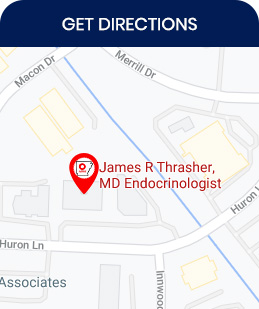Early Signs You Might Have a Thyroid Disorder
Fatigue, unexpected weight changes, and mood swings could be early signs of a thyroid disorder. Dr. James Thrasher at the Arkansas Diabetes and Endocrinology Center offers expert care to manage thyroid conditions. With personalized treatment, Dr. Thrasher can help you take control of your thyroid health. For more information, contact our office to schedule an appointment. We are conveniently located at 11400 Huron Lane, Little Rock, AR 72211.


Table of Contents:
What are the early symptoms of a thyroid problem?
How can I tell if my tiredness is due to thyroid issues?
Can weight gain be a sign of a thyroid disorder?
Could my hair thinning or hair loss mean I have thyroid issues?
At Arkansas Diabetes and Endocrinology Center, we understand that thyroid problems can significantly impact your overall health and quality of life. Recognizing the early symptoms of thyroid dysfunction is crucial, as they may vary greatly among individuals and can often be subtle or easily overlooked.
Common Early Symptoms of Thyroid Disorders Include:
• Persistent Fatigue: Feeling consistently tired or exhausted, even after sufficient sleep, can be an early sign of thyroid dysfunction.
• Unexplained Weight Changes: Noticeable weight gain without dietary or activity changes often points to hypothyroidism, whereas sudden weight loss may indicate hyperthyroidism.
• Mood and Emotional Changes: Changes in emotional well-being, including increased anxiety, irritability, depression, or mood swings, could be linked to thyroid imbalance.
• Temperature Sensitivity: Feeling unusually cold may be a sign of hypothyroidism, while experiencing excessive heat intolerance could indicate hyperthyroidism.
• Skin and Hair Issues: Early thyroid problems can cause skin to become dry, flaky, or pale, and hair may become thin, brittle, or fall out more easily.
If you or a loved one notices multiple symptoms persisting or worsening, we encourage you to visit your Primary Care Physician to see if you need a specialist like those at Arkansas Diabetes and Endocrinology Center. Our experienced team specializes in managing thyroid disorders, providing comprehensive care tailored to your individual health needs.
Fatigue is a common complaint among individuals managing diabetes or endocrine disorders, and at Arkansas Diabetes and Endocrinology Center, we understand how significantly it can impact your quality of life. Thyroid dysfunction, in particular, is frequently associated with persistent fatigue and related symptoms. Determining whether your fatigue is thyroid-related involves recognizing associated symptoms and consulting our endocrinology specialists.
Hypothyroidism, or an underactive thyroid, often presents with persistent tiredness, sluggishness, weight gain, cold intolerance, dry skin, constipation, hair loss, and mood changes such as depression or irritability. Conversely, hyperthyroidism—an overactive thyroid—can also lead to fatigue, typically accompanied by symptoms like restlessness, rapid heartbeat, unexplained weight loss, heat intolerance, anxiety, irritability, and difficulty sleeping, despite constant exhaustion.
If you are experiencing fatigue along with several of these symptoms, thyroid dysfunction may be contributing to your condition. However, because fatigue is a nonspecific symptom that can also be associated with diabetes or other endocrine-related conditions, a comprehensive evaluation by your Primary Care Physician will help determine if a specialist is essential.
If you suspect your fatigue may be thyroid-related or connected to another endocrine condition, our team at Arkansas Diabetes and Endocrinology Center can provide specialized guidance,and individualized treatment plans. Reach out today to schedule an appointment, and let us help you regain your energy and improve your overall health.
At Arkansas Diabetes and Endocrinology Center, we understand the challenges associated with thyroid disorders, particularly hypothyroidism, and how they can impact your weight and overall quality of life. Hypothyroidism occurs when your thyroid gland doesn’t produce enough thyroid hormones, which play a crucial role in regulating your metabolism—the process your body uses to convert food into energy. When thyroid hormone levels decrease, your metabolic rate slows, contributing to symptoms such as fatigue, increased sensitivity to cold, constipation, muscle weakness, dry skin, hair loss, depression, trouble concentrating, and gradual weight gain.
Weight gain related to hypothyroidism often happens slowly, making it difficult to recognize initially. Patients frequently report struggles with losing weight, despite following a nutritious diet and regular exercise routine. However, it’s important to remember that thyroid disorders are just one potential cause of weight gain; other factors such as diet, physical activity, stress, hormonal fluctuations, and certain medications can also play a significant role.
If you’re experiencing unexplained weight gain along with symptoms such as fatigue, cold intolerance, dry skin, hair loss, depression, or difficulty concentrating, visit your Primary Care Physician to find out if a specialist could help.
Fortunately, hypothyroidism is highly manageable with appropriate treatment, typically involving thyroid hormone replacement therapy. At Arkansas Diabetes and Endocrinology Center, we specialize in personalized care designed to restore metabolic balance and help alleviate symptoms such as weight gain, enhancing your overall health and well-being.
Hair thinning or hair loss may sometimes be connected to endocrine conditions, particularly thyroid issues. At Arkansas Diabetes and Endocrinology Center, we specialize in managing hormone-related conditions, including thyroid disorders. Your thyroid gland, located at the base of your neck, produces essential hormones that regulate metabolism, growth, and overall body function. When thyroid hormone levels become imbalanced—either too high (hyperthyroidism) or too low (hypothyroidism)—hair loss or thinning can be a noticeable symptom.
In hypothyroidism, the slowed metabolic activity can cause your hair to become brittle, dry, and sparse. Frequently, individuals experience thinning hair across the scalp and potentially on the eyebrows as well. Conversely, hyperthyroidism, characterized by excess thyroid hormones, can also result in hair thinning, typically accompanied by symptoms like rapid weight loss, anxiety, increased heart rate, or sweating.
If you are experiencing hair thinning along with other symptoms such as fatigue, weight changes, mood fluctuations, or sensitivity to temperature extremes, consider visiting your Primary Care Physician to determine if you need to see a specialist like those at Arkansas Diabetes. A simple blood test can evaluate your thyroid hormone levels and determine if an imbalance may be contributing to your hair loss. With proper diagnosis and treatment, thyroid-related hair loss is typically reversible, and our experienced healthcare providers will work closely with you to restore hormone balance and support healthy hair growth. For more information about endocrine disorders, contact us. We serve patients from Little Rock AR, Conway AR, North Little Rock AR, Pine Bluff AR, Hot Springs AR, Benton AR, Sherwood AR, Russellville AR, Jacksonville AR, Cabot AR, Searcy AR, Bryant AR, Jonesboro AR, Forrest City AR, Magnolia AR, Camden AR, Malvern AR, Batesville AR, Arkadelphia AR, Clarksville AR, Monticello AR, Heber Springs AR, Morrilton AR, Stuttgart AR, Greenbrier AR, Sheridan AR, and Vilonia AR.







